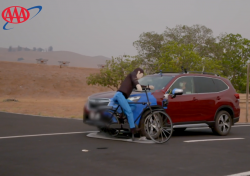
— Advanced driver assistance system (ADAS) research indicates the systems have a long way to go before vehicles actively and routinely avoid obstacles and crashes.
And unfortunately, the latest ADAS research conducted by AAA Automotive Engineering supports conclusions reached in prior research studies.
AAA found vehicles with an active driving assistance system failed to consistently avoid crashes with another car or bicycle during 15 test runs.
The ADAS research was conducted by using a 2021 Subaru Forester with its “EyeSight” system, a 2021 Hyundai Santa Fe with “Highway Driving Assist” and a 2020 Tesla Model 3 with “Autopilot.”
According to researchers, a head-on collision occurred during all 15 test runs for an oncoming vehicle within the travel lane, and only "one test vehicle significantly reduced speed before a crash on each run."
And for a cyclist crossing the travel lane of the test vehicle, a collision occurred five times out of 15 test runs.
However, there were no collisions during 15 test runs for a slow lead vehicle moving in the same direction in the lane ahead, and the same results were found for a cyclist traveling in the same direction in the lane ahead of the test vehicle.
Engineers did find the vehicles performed as expected during closed-course testing for "routine situations," such as approaching a slowing moving vehicle or bicyclist from behind.
"However, all test vehicles collided with either the simulated passenger car or the adult cyclist multiple times during 'edge-case' testing, like a car approaching head-on or a bicyclist crossing directly in front of the test car. This reinforces recent AAA research calling for direct driver monitoring systems with camera-based technology to be integrated into active driving assistance systems." — AAA Automotive Engineering
Full testing and vehicle information for the advanced driver assistance system research can be downloaded here (PDF).
Drivers Still Scared of Self-Driving Cars
In separate research from the organization, consumers are more concerned with improving driver assistance systems (77%) than they are with automakers designing self-driving vehicles (18%).
AAA researchers found the majority of consumers simply don't trust autonomous vehicles, matching the results of previous research. In one situation where a vehicle is transporting children or loved ones, about 85% say they wouldn't be comfortable if the vehicle was driverless.
And according to researchers, they found a "troubling belief" when 12% of consumers said they believed they could currently purchase a full self-driving car, while another 53% said they didn't know if it was possible to purchase one.




